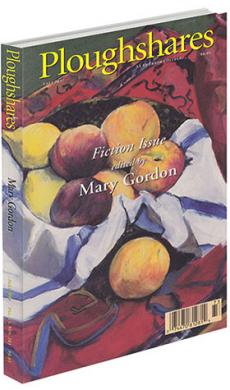rev. of The Hour Between Dog and Wolf by Laure-Anne Bosselaar
The Hour Between Dog and Wolf
Poems by Laure-Anne Bosselaar. BOA Editions, $12.50 paper. Reviewed by Wyn Cooper.
It is obvious from the first poem in Laure-Anne Bosselaar’s debut book of poetry in English that her concerns will be large: “while my grandfather, a prisoner of war / in Holland, sewed perfect, eighteen-buttoned / booties for his wife with the skin of a dead / dog found in a trench, shrapnel slit / Apollinaire’s skull, Jesuits brandished / crucifixes in Ouagadougou, and the Parthenon / was already in ruins.” The poem, and the book’s first section, is called “The Worlds in This World,” an apt name for a poem — and a poetry — so inclusive.
Bosselaar, whose first book,
Artemis, was published in French, grew up in Belgium. The poems in her new book, particularly in the first section, do more than address life there — they evoke it in every color, smell, texture, and taste. It’s more bitter than sweet: life in a convent of nuns devoted to God in shocking ways: “We knew what to do: kneel by the empty bottle pile, slip on the gloves, / grab a bottle by its neck, and wait for the signal. It never took long: / with a wail, her half-empty bottle split the air over our heads / / and shattered against the wall.” These narrative poems have so much to say, the lines tend to be long, but Bosselaar’s ear is never far from the lyric.
One of the book’s strongest points is its variety. The second section, “Lost Souls Roaming,” is a series of short lyric meditations on place, from the Rockies to Europe, that bring us to the present. I wondered at first why I found these poems as powerful as the not-for-the-timid narratives that preceded them, until I looked more closely at how Bosselaar makes the land come to life, even stand for the lives of those in the poems: “and the landscape opens like a naked body, / trembles with skin-colored hills, bone-pale / rocks, coppery shadows and deep / crevices, dark.” It is from under those shadows that the power of these poems makes its way into “every branch, / every twig, every single waving leaf.”
“Inventory,” the book’s final section, is just that. The first poem, “Fallen,” takes the idea of a found poem in a new direction: the narrator receives dahlia tubers in the mail, wrapped in shredded paper which, it turns out, is a losing manuscript from a poetry contest. Bosselaar includes two memorable lines, saves them for posterity from the shredder, and in the process makes a comment about the state of poetry, something also addressed by Charles Simic in his excellent introduction. Other poems in this section explore Bosselaar’s love of language (she’s fluent in four), love of the natural world, and love for her adopted country, but the real love — romantic love — poems are ultimately the most moving. Without the slightest hint of sentimentality or confession, they are unabashed and unequaled, startling in their impact and, like this book, unforgettable.
Wyn Cooper recently completed his second book of poems, The Way Back
. His poems, stories, reviews, and essays have appeared widely. He lives in Vermont.

